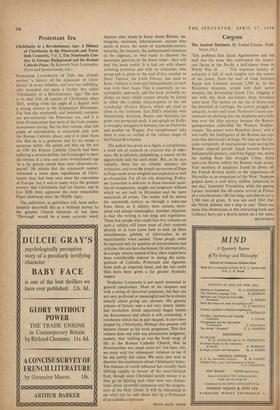Protestant Era
Christianity in a Revolutionary Age: A History of Christianity in the Nineteenth and Twen- tieth Centuries. Vol. I, The Nineteenth Cen- tury in Europe: Background and the Roman Catholic Phase. By Kenneth Scott Latourette. (Eyre and Spottiswoode, 63s.)
PROFESSOR LATOURETTE Of Yale has already written 'a history of the expansion of Chris- tianity' in seven volumes, and now has indefatig- ably launched out upon a further five called `Christianity in a Revolutionary Age.' His aim is to deal with all aspects of Christianity since 1815, writing from the angle of a Baptist with a strong interest in the Ecumenical Movement. For him the nineteenth and twentieth centuries are pre-eminently the Protestant era, and it is from Protestantism that most of the fresh creative movements sprang. But his first volume, after 200 pages of introduction, is concerned only with the Roman Catholic phase, and it is clear from this that he is a generous and by no means a sectarian writer. He points out that on the eve of 1789 the Roman Catholic Church had been suffering a serious decline; but it managed to meet the threats of a new and more revolutionary age 'to a far greater extent than most observers ex- pected.' He admits that the nineteenth century witnessed a more open repudiation of Chris- tianity than had been seen since the conversion of Europe, but it was in many ways the greatest century that Christianity had yet known, and in Leo XIII there appeared the most remarkable Papal statesman since the Middle Ages.
The publishers, as publishers will, have unfor- tunately described this as a brilliant survey by the greatest Church historian of our time. `Thorough' would be a more accurate word. Anyone who wants to know about fideism, on- tologism, molinism, febronianism; anyone who needs to know the dates of nineteenth-century miracles, for instance, the authenticated instances of the stigmata, or who wants to discover the successive generals of the Jesuit order : they will find this book useful. It is laid out with almost irritating precision and with no omissions. One paragraph is given to the curd d'Ars, another to Sister Therese, the Little Flower, one each to Kant, Voltaire, Comte and Schopenhauer, in each case with their dates. This is essentially an en- cyclopedic approach, and the book probably in- cludes no facts which cannot already be found in either the Catholic Encyclopaedia or the old Cambridge Modern History which are cited so often in the footnotes. Leo XIII's relations with Switzerland, Scotland, Russia and Australia are given one paragraph each. A paragraph on Kafka is strangely smuggled in between one on Nietzsche and another on Wagner. For completeness' sake there is even an outline of the various stages of the French Revolution.
The author has given us a digest, a compilation, a work not of research or criticism but of refer- ence. He is infinitely painstaking, a master of the pigeon-hole and the card Index. But, as he says ruefully, there are no reliable statistics for mysticism, and even the simple succession of Pope to Pope needs to be weighed and explained as well as chronicled. For all his tidy docketing, Profes- sor Latourette is deficient in those essential quali- ties of imagination, insight and judgment without which we are back to Dryasdust and the mere succession of events. The reader will be shown the nineteenth century as through a telescope from Mars, as if history were remote, desic- cated and almost meaningless. Another objection is that the writing is too long and repetitious. Those few people who could face five volumes on such a subject will know most of their contents already or at least know how to look up these miscellaneous gobbets of information in an encyclopedia when needed. Those people could be captured only by qualities of interpretation and criticism that are here disclaimed. Or alternatively, in a single volume instead of five, there might have been considerable interest in seeing the juxta- position of Catholic, Protestant and Agnostic from such an impartial hand, and the tale could then have been given a far greater dramatic impact.
Professor Latourette is not much interested in general conclusions.• Most of his chapters end with a string of rhetorical questions, but they are not very profound or meaningful and he is always miserly about giving any answers. His general scheme of history sees a not very clearly identi- fied revolution which apparently began before the Renaissance and which is still continuing, a revolution which has in part shaped, in part been shaped by, Christianity. Perhaps this process will become clearer as his work progresses. This first volume does end with one provocative judgment, namely, that 'striking as was the fresh surge of life in the Roman Catholic Church, that in Protestantism was much more so'; but here, too, we must wait for subsequent volumes to see if he can justify this claim. We must also wait to
discover his conclusions about Christianity today. The balance of world influence has recently been shifting rapidly in favour of the non-Christian East, though some Christians hardly notice it as they go on fighting each other over nice distinc-
tions about apostolic succession and the progres- sion of the Holy Ghost. It will be interesting to see what can be said about this by a Protestant of so catholic a tolerance.
DENIS MACK SMITH


































 Previous page
Previous page